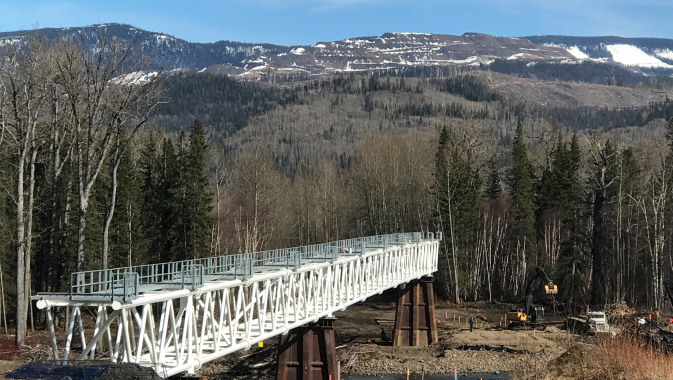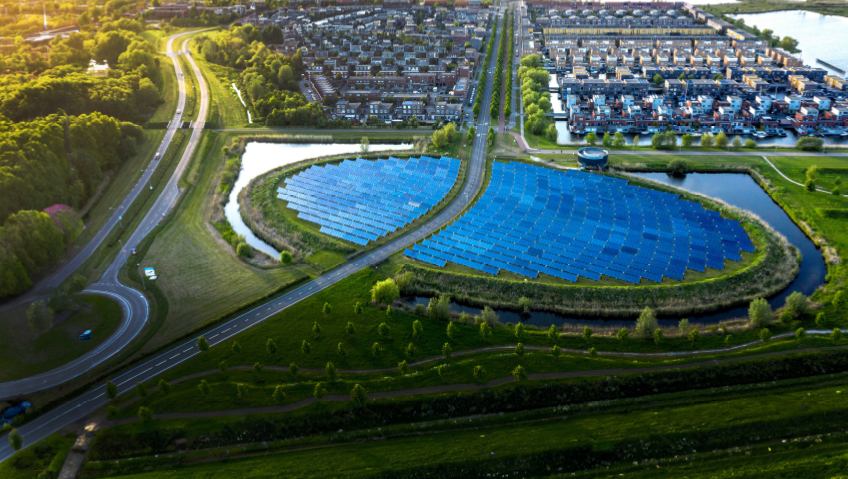Formula Contractors Ltd. of Prince George, British Columbia, has been working at the top of the world. The firm specializes in putting up steel structures and bridges, putting down foundations and doing pile driving and heavy civil construction.
~
Formula Contractors completed work this April on the Inuvik-Tuktoyaktuk Highway. The all-weather, 120-kilometer, two-lane highway in Canada’s Northwest Territories connects the tiny hamlet of Tuktoyaktuk with the town of Inuvik. The $300 million project is the first permanent road of its kind to the Arctic coast. Formula’s work involved constructing eight bridges on the highway, over four winters from 2014 to 2017.
“It was pretty cool to be part of that. Driving up, you see the ice road truckers on the Mackenzie Delta ice road. You leave Inuvik, go up the Mackenzie River, next thing you know, you’re on the Beaufort Sea, and you’re driving on the edge of the ocean, and that little dot ahead is Tuktoyaktuk. It was neat being [involved in that project],” states Director of Operations Phil Toma.
The highway was officially opened in November 2017, so truckers no longer have to rely on seasonal ice toads to reach Tuktoyaktuk.
Challenging as it was, building bridges for the Inuvik Tuktoyaktuk Highway was pretty much par for the course at Formula. The firm excels at “dirty, nasty, hard access jobs. That’s our bailiwick. That’s what we do,” states Toma. Such jobs generally center on “bridges, foundations, structures and earthworks … Construction is our main bread and butter.”
From its Prince George base, Formula has branches in Victoria and Pouce Coupe, British Columbia and a yard and shop in Grande Prairie, Alberta.
In addition to its main duties, the firm offers heavy equipment rentals with crawler cranes, bridges, bulldozers and excavators, among other gear. Formula also provides a portable bridge rental service. The standard rental portable bridges can handle a hundred-tonne load with a deck that is 4.3 metres wide.
As for construction, Formula self-performs most of its own jobs. “We do about ninety percent of all the work,” says Toma. “We pretty well do all our own concrete and pile-driving work.” The company will bring in sub-contractors for some tasks such as earth stabilization and fabrication.
Formula maintains a fleet of vehicles and equipment, including pile drivers and cranes. The company offers drilling and pile driving services for projects involving foundations, retaining structures and bridges. Designing and erecting steel structures for building projects is another company specialty, as is constructing bridges. Formula can offer anything from a concrete slab bridge measuring only a few meters to design-build projects involving 120 metre-long bridge structures.
The company primarily serves customers in the resources sector, including forestry, oil and gas and mining. Formula has also worked in the growing renewable energy sector. Formula’s main focus is western and northern Canada. “Our area is British Columbia, Alberta, Saskatchewan, Manitoba, the Northwest Territories and the Yukon. That’s where we work,” states Toma.
Formula was established in 1977 by Peter Thwaites. The firm was tiny, at first. “It was just Peter and a few guys. The maximum might have been ten guys. But for the type of bridge work we do, our crews aren’t that big,” recalls Toma. Thwaites remains president today. He runs the company with two partners, one of whom is Toma.
Things were considerably less formal in the old days “Estimates then were done on the back of cocktail napkins. It’s not done that way anymore,” recalls Toma. However, the company ethos was the same. From the start, Formula earned a reputation for working hard and taking on tough jobs.
Then, as now, it served the resources field, with an emphasis on bridge construction. “We’re still sort of the initial pioneering heavy resource bridge construction company in Western Canada,” states Toma proudly.
The number of people who work for Formula fluctuates from project to project, says Toma. At one point recently, the firm counted as many as 180 workers. In general, there is a core group of around forty individuals who constitute the permanent staff. The company works with unions, which provide the appropriate manpower for big projects. There is an obvious benefit to hiring unionized staff; such workers are guaranteed to have all the necessary training, industry certifications and safety knowledge.
Indeed, making good staffing decisions has been key to Formula’s longevity, says Toma. The company treats its workers well and they show their appreciation through loyalty. “A lot of our success comes from Peter surrounding himself with the right guys to get the job done. We have a good retention rate. Our guys have been here [on average] five to ten years. We have a safe, successful company. We make it a fun place to work. We do very, very interesting jobs. That’s what we have going for us,” he states.
When it comes to safety, Formula is certified to several standards including the Certificate of Recognition (COR) program run by the Canadian Federation of Construction Safety Associations and SAFE companies run by the BC Forest Safety Council. The company also has certification from standards organizations such as ISNetworld and Avetta.
A Formula resource manager handles safety and equipment management. This official creates then tracks safety systems based on project requirements. Equipment is routinely inspected and maintained while superintendents and foremen ensure a safe working environment for both full-time employees and subcontractors.
Likewise, every project Formula undertakes is based around on a quality management plan (QMP) that takes into account standards and expectations from the client, regulatory agencies and the company itself. “We have our own internal quality systems,” says Toma.
A few years ago, Formula worked on a design-build project that put together a concrete deck and steel girder bridge on the Mackenzie Valley Winter Road, near Norman Wells, Northwest Territories. The bridge was 108 metres long and rests on a drilled pile foundation. The project was completed March 2014. The client was the Government of the Northwest Territories.
Formula was also contracted for construction duties in northwest British Columbia for the Brucejack Mine – a huge, underground gold mine – project. Among other chores, Formula Contractors erected steel grills for a main camp structure. This assignment involved the use of a crawler crane and was completed in May of last year.
The company’s bridge construction and pile-driving expertise was utilized to build a new construction access bridge for the Site C Renewable Energy project on British Columbia’s Peace River. Formula also supplied and installed drilled pipe piles at over one hundred locations. The piles in question were secured in a shale formation and were installed to ensure slope stability. This assignment was completed in April 2017.
Formula has also branched out into the green resource sector. About a decade ago, the company constructed all the foundations for the first wind farm built in British Columbia.
Formula chooses its suppliers carefully. Price, service and quality are the main prerequisites, says Toma. Having reliable vendors is extremely important in an industry built around tight schedules and fierce competition. If Formula is working on a construction project scheduled to last five weeks that involves supply of bridge girders, a delay in not having the required materials for even one day could mean a loss of thousands of dollars and put the project behind schedule, according to Toma.
Formula occasionally attends trade shows, particularly in the mining sector. However, to a large extent, the company relies on word-of-mouth for much of its promotion. “It’s a tight industry,” says Toma, adding that many jobs are generated because “somebody knows somebody.” This is not to suggest Formula is resting on its laurels; while the company has an excellent reputation, “reputation only goes so far. You have to support that with sales. So once every couple months, you’re banging on the doors of the companies you work with,” to inquire about new projects.
Formula has had to contend with challenging economic conditions. The oil and gas sector, in particular, has been going through tough times, with the price of oil declining drastically. At present, much of the work in the sector is centered on maintenance, not exploration or new construction. “There’s not a lot of greenfield work going on right now [in oil and gas]. That needs to improve,” he says.
Still, Formula does not plan to branch into any new sectors or add new services. The company has spent decades perfecting its skills in specific sectors and has no intention of moving away from what it does best. “[We want to] build upon what we do,” says Toma. “We realize what we do are foundations and bridges and concrete steel erection. People recognize us for that, as well as access structures. We are going to continually build on that.”













